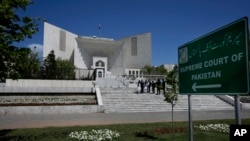A majority of federal High Court judges in Pakistan have jointly accused the country's military-run spy agency of intimidating them and their relatives through abduction, torture, and secret video surveillance inside their bedrooms to influence judicial outcomes.
In a rare letter this week addressed to mostly Supreme Court judges, including the chief justice, six out of eight members of the Islamabad High Court documented the allegations and sought their intervention to resolve the complaint.
It prompted Chief Justice Qazi Faez Isa to summon an emergency meeting of all the Supreme Court judges to discuss the matter on Wednesday.
The letter dated March 25 blamed the Inter-Services Intelligence, or ISI, for meddling in judicial proceedings "to seek a certain outcome." An army general runs the spy agency, and it is notorious for allegedly orchestrating the making or breaking of elected governments at the behest of Pakistan's powerful military.
The Pakistani military has not responded to VOA’s request for comment on the allegations.
"We believe it is imperative to inquire into and determine whether there exists a continuing policy on the part of the executive branch of the state, implemented by intelligence operatives... to intimidate judges, under threat of coercion or blackmail, to engineer judicial outcomes in politically consequential matters," the letter read.
It highlighted several instances of attempted coercion and intimidation by ISI officers "to influence the outcome" of cases, including those related to jailed former prime minister Imran Khan.
Referring to a March 2023 state-backed lawsuit against Khan, the letter said that "considerable pressure was brought to bear" on judges "by operatives of the ISI." It said the judges sought additional protection for their homes over personal security fears.
"One of the judges had to be admitted to a hospital due to high blood pressure caused by stress," it noted.
The letter recounted the abduction of a "brother-in-law" of the Islamabad high court judge by alleged ISI operatives. It added that the abductee "was administered electric shocks" and "tortured into making false allegations" on camera against the judge.
"We, therefore, request that a judicial convention be called to consider the matter of interference of intelligence operatives with judicial functions and/or intimidation of judges in a manner that undermines [the] independence of the judiciary," the judges wrote.
The letter was delivered to the Supreme Judicial Council, the governing authority of the judiciary in Pakistan.
The unprecedented chargesheet against the military has triggered calls from lawyers' associations, Khan's opposition Pakistan Tehreek-e-Insaf, or PTI, party, and independent critics to hold an independent inquiry and prosecute those involved. They lauded the judges for revealing the alleged interference of ISI operatives in the judicial work.
"If judges of the higher courts are subjected to such blatant interference, then by extension, it is likely that the lower courts are even more vulnerable," said the Human Rights Commission of Pakistan, a leading independent watchdog.
"Such authoritarian tactics have compromised the integrity of the legal system at the cost of people’s access to justice, which is at the core of the constitution," it stated.
The HRCP called for bringing Pakistan's intelligence services under "transparent civilian oversight" through new legislation, saying it would help strengthen democratic checks and balances.
"Everyone has known the pressure the courts have been under, but the bravery of these 6 judges must be applauded," Imaan Zainab Mazari-Hazir, a human rights lawyer in Islamabad, said on X, formerly known as Twitter.
"Pushing politicos, press, or the judiciary the wrong way is counterproductive and is bound to have consequences, as we see in this letter," said Mushahid Hussain, a former Pakistani senator.
"Revolt of the judges! Truly unprecedented!" he said. "This is the litmus test for the Supreme Judicial Council: will it move to protect its protesting ‘brother judges,’ who are working in the heart of the nation’s capital?" Hussain added.
Michael Kugelman, the director of the South Asia Institute at Washington's Wilson Center, said the letter underscored "just how deep, extensive, and serious the establishment's interference is these days."
"The establishment" is a term commonly used to refer to the Pakistan military.
"The stunning letter written by six Pakistani high court justices illustrates not only the extent of interference in the legal process, at the highest levels but also the willingness of public servants to go public about it despite the risks that doing so may pose for them," Kugelman said on X.
In the lead-up to the parliamentary elections in Pakistan last month, the military was constantly accused of influencing judicial proceedings and cracking down on Khan's party to keep him in jail over controversial convictions. Eventually, he was barred from running in the February 8 vote, and PTI candidates were restricted from winning the majority, despite representing the most popular party, according to public surveys.
Many of the nearly 200 state-instituted lawsuits against Khan are pending in the Islamabad High Court. The 71-year-old incarcerated politician rejects all the charges as politically motivated, saying the military is behind them.
A statement posted on Khan's X social media account said, "The fact that the judges have been intimidated and coerced into giving judgments based on political expediency raises a lot of questions on the fairness of the courts and their judgments over the last 2 years."
Khan, the cricket hero-turned-prime minister, was ousted from power in April 2021 through an opposition parliamentary vote of no-confidence, a move he denounced as orchestrated by the military, allegations the institution rejected.
The military has ruled Pakistan for more than three decades through coups against elected governments since the country gained independence in 1947. Former prime ministers, including Khan, have publicly accused army generals of interference in national politics even when not in power in violation of the constitution.
The army denies the allegations, but its former chief, General Qamar Javed Bajwa, acknowledged in a nationally televised speech just days before his retirement in November 2022 that his institution had been meddling in politics for the past 70 years.






